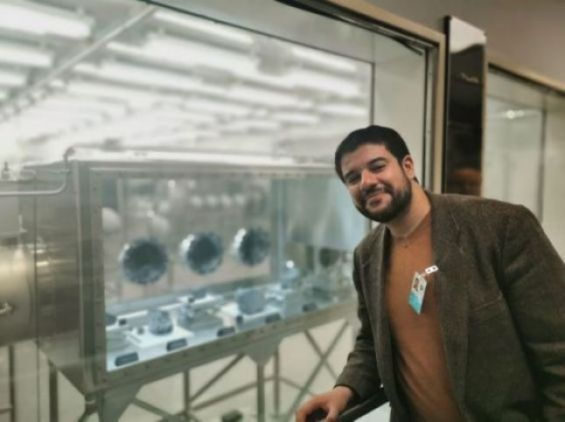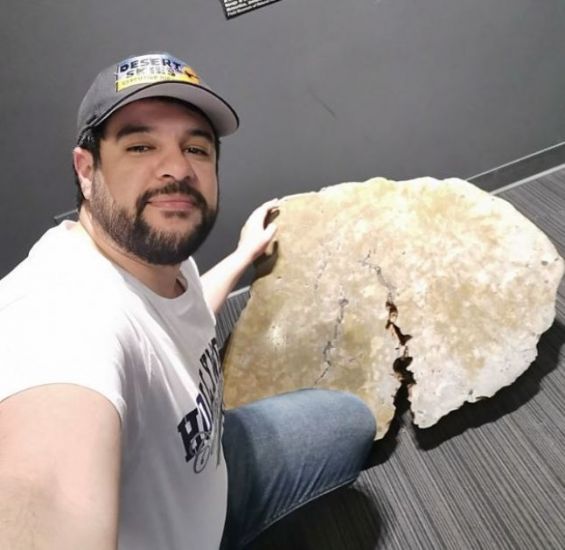It all started on the terrace of his parents’ place in Meknes. Every night, when he was a child, Taha Shisseh used to sit in the roof of his house and gaze at stars, planets, celestial bodies and starlights that decorate the skies.
Years passed and Taha grew up dreaming of diving into the world of planets and meteorites. At the age of 29, he remembers how his passion for space started like it was yesterday. «Growing up, I loved everything related to planets», he told Yabiladi.
He was to another path, however, unexpectedly. After getting a degree in water and the environment at the Faculty of Science and Technology affiliated to the University of Sidi Mohamed Ibn Abdellah in Fez, he went for natural sciences studies at the Hassan II University of Casablanca.
His studies would not drive him away from his passion for stars. «I never knew I could study astronomy in Morocco until I coincidentally met with specialist teachers», he recalls. This space lover did not hesitate to take this opportunity by switching his major and rediscover his childhood dream. In 2017, he worked on his PhD thesis about planets and meteorites.
«Although I chose a completely different path from what I studied, geology remains very close and linked to thie field, which encouraged me to take up the challenge».
New opportunities in Santa Fe
Taha has chosen to further deepen his research in meteorites and planets, studying a Moroccan meteorite which fell in 2014, then a second one that fell in Algeria in 2013. Six months later, he traveled to Santa Fe (New Mexico), to participate to an international conference on meteorites, the world's largest meeting of its kind.
«My research subject has been chosen to participate in the conference», Taha proudly said . «Discovering this world, and in a few months, through my participation in this international event was a pride and a great challenge for me», he recalled.
Taha's research subject has transformed his life into that of a globetrotter, traveling around the world to find answers to the secrets and mysteries of space and asteroids. During his travels, he always carries with him a backpack full of meteorites and scientific equipment. «I take a meteor with me wherever I go. That way, when people I meet ask me questions about my specialty, I show them a stone from space, since they have never touched it. I grew fond of the way they look at it, with a mix of astonishment and joy», he further said.

To support himself during his studies, Taha applied for a scholarship allowing him to discover advanced and modern scientific processes. Thus, for the first time, he received a scholarship from France to pursue his studies at the National Museum of Natural History in Paris, but also to work on another group of meteorites. In the French capital, he spent seven months before moving to Russia, to participate to the international conference on meteorites.
In October 2018, he moved to Italy after receiving another scholarship to complete his research at the University of Pisa, where he spent five months. «Whenever I would return to Morocco to write reports on my discoveries, I would already be starting a new adventure», he said, describing his enthusiasm at the idea of discovering new scientific adventures each time.
The researcher then moved to the United States, after having obtained one of the most important American scholarships from the Fulbright program, for academic exchange aimed at improving relations between cultures, cultural diplomacy and intercultural skills between the United States and other countries.
Following a dream
In September 2019, Taha went to the Meteorite Institute at the University of New Mexico. Bringing together experienced researchers, this center is one of the oldest institutes specializing in the field. In addition to working on Moroccan and Algerian meteorites, Taha is currently working on a collective project with scientists from the National Aeronautics and Space Administration (NASA).
In recognition of Taha’s skills and efforts, his name was given to one of the asteroids discovered in space from Switzerland by one of the astronomers who knew him. Taha also helped name three meteors, a French and two Moroccan ones.

After visiting many countries, Taha decided to settle down in the United States. Next August, he will travel to Morocco for his PhD, before returning to the US to continue his career. His dream now? Joining NASA or the university where he is currently.
The other hope of this young researcher remains that the Moroccan government gives more importance to researchers in all scientific fields, by providing them with the means that will contribute to the training of managers that Morocco desperately needs. «We feel this lack even more today, with the coronavirus pandemic, and we have incredible energies which are worth investing in this sector», he hopes.





 chargement...
chargement...














